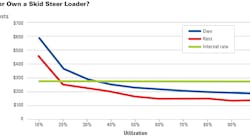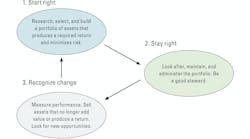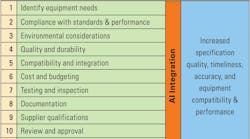Years ago, my boss had a favorite saying: “What’s everybody’s business is nobody’s business.” It was a way of reminding us that accountability is very important. If you don’t have clearly assigned responsibilities, no one feels the pressure to take the reins and manage the task. I don’t have to sell you on this. We all know intuitively that groups of people (like a committee) are not good decision makers. Give one man or woman a task, hold him or her accountable, and things will get done.
Now let’s take this concept and apply it to the equipment fleet in your organization. To get the longest component lives and the lowest cost per hour and lowest downtime, there are four things in your company that need to be managed by an assigned person—not necessarily the same person, but one person. In no specific order, they are:
1) Fuel purchasing and storage/handling.Ten years ago, retail No. 2 diesel was $1.32 a gallon. Since then, it has galloped upward to $3.84 a gallon (source: U.S. Energy Information Administration). That’s almost a tripling of fuel costs. Today, fuel costs in common earthmoving machines approximates one-third of the total equipment costs. An individual in your organization needs to be assigned the task of spec’ing and buying your fuel, and managing the receiving, storage, and redistribution of the fuel. See Manage Fuel Like It Matters for details. Having a companywide fuel strategy just makes sense today. Costs aside, fuel now has to be cleaner, lower in sulfur, theft-protected, and balanced against alternative fuels. Do a quick mental audit of your own organization. Can you name the fuel czar in your company?
2) Preventive maintenance and lubricants.This is a huge and complex topic, and certainly a lot of your employees are involved. But only one person should be the designated manager. Choose and buy common lubricants. Choose and use some defined system to alert the right people to do the periodic services. Ensure the services are done as scheduled. When you learn something useful in one location, incorporate into all the other locations. Like fuel, there should be one designated PM czar in your company. Who is it?
3) Oil sampling.This is usually wrapped into the PM part of most companies. Oil sampling is an inspection program. Don’t confuse it with oil. Since the oil samples are usually drawn by your field maintenance staff and later sent to your lab, who in your company follows the “alerts” and “cautions” that come back a week later? This is where most oil sampling programs fail. If there is not a designated action follow-up on the lab results, you wasted your money and effort. More than half of the companies I studied drop the ball at this point. Everyone is so busy that the email alert from the lab doesn’t get the attention it needs. Oil sampling should be assigned to someone who has the knowledge and time to manage it.
4) Telematics.This is the new kid on the block. For five years now, most equipment manufacturers have been building in sensors all over your machines. The overwhelming surge of data that comes from these sensors will choke a horse. Sure, some of the systems don’t work that well. Sensors fail and over-report. But this whole telematics arena is far too valuable to ignore. The program should be assigned to one tech-savvy person in your company who can and will make it work. Many companies simply have given up this program and are waiting for a simpler, more reliable 2.0 version to arrive. There is too much good data that can become good information to ignore telematics. Assign it, and watch good things happen.
My old boss was right. What’s everybody’s business does become nobody’s business. Officially assign these four programs to accountable people, and good things will happen. Think about it.




